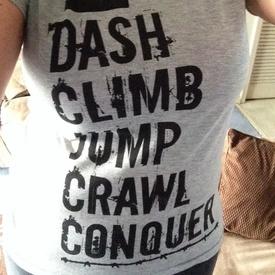Is it true that Muscle weights more than Fat?
Replies
-
From what I've read on here, 1lb of rice is heavier than 1lb of feathers. And a 10lb dumbell is heavier than a 10lb ream of paper.....but that 2nd one might be because a ream of paper is 5lbs, so.......??
Bahahaha! I always think of that thread when this question pops up.
I'm glad I'm not the only one!! And remember kids, a very wiser person once said: Education doesn't make a person smart!...hahahahaha0 -
A pound is a pound no matter what the object is... One pound of muscle takes up less space than a pound of fat.
THAT IS WHAT "HEAVIER" MEANS.
no, that's what "more dense" means.
THEN WHAT EXACTLY DO YOU THINK THE WORD "HEAVIER" MEANS?????????????????????
*headdesk* *headdesk* *headdesk* x1,000,000,000,000,000,0000 -
A pound is a pound no matter what the object is... One pound of muscle takes up less space than a pound of fat.
THAT IS WHAT "HEAVIER" MEANS.
no, that's what "more dense" means.
THEN WHAT EXACTLY DO YOU THINK THE WORD "HEAVIER" MEANS?????????????????????
HEAVY IS A SYNONYM OF DENSE.
Are the keys heavier when you use the CAPS LOCK?? Yeah, didn't think so.0 -

I like pictures. Muscle is more dense than fat.0 -
Muscle is more dense than fat is the correct way to put it.
I think that's silly. No one ever says rocks are more dense than feathers. They say rocks weigh more than feathers. When you have the same amount of any 2 substances and one is heavier, most people say the heavier substance weighs more.
But however you put it, pretty much everyone knows what you mean. Does anyone REALLY think someone is suggesting that a unit of measure (such as a pound) is heavier than that same unit of measure when they say or ask if muscle weighs more than fat.0 -
A pound is a pound no matter what the object is... One pound of muscle takes up less space than a pound of fat.
THAT IS WHAT "HEAVIER" MEANS.
No, a pound of fat is the same weight as a pound of muscle. Muscle is denser, not heavier.
Density and weight are not the same thing.0 -
Hey Guys, I think we got a troll.
The OP has a bunch of topics with the same kind of thing going on. Probably the BB.com guys again.0 -
ouch! but LOL!I was curious because I hear people say oo this week I gained 2lbs but I think its muscle and not fat...
This is called "denial".0 -
Wow, only on MFP could we take a simple question like this and turn it into a 2 page thread. Instead of being smartasses and pointing out the obvious 1lb = 1lb argument, why couldn't the first respondent and countless others have answered the question this way: "Well muscle is more DENSE than fat which means 1 cup of muscle will weigh more than 1 cup of fat".
Seriously, can we be somewhat helpful here. Yes the original question was flawed but you all knew what the OP meant to ask so why not be helpful instead of being pedantic and sarcastic.0 -
From what I've read on here, 1lb of rice is heavier than 1lb of feathers. And a 10lb dumbell is heavier than a 10lb ream of paper.....but that 2nd one might be because a ream of paper is 5lbs, so.......??
ROFLMAO. I remember that thread. That was a good one for laughing and crying at the same time!0 -
THEN WHAT EXACTLY DO YOU THINK THE WORD "HEAVIER" MEANS?????????????????????
HEAVY IS A SYNONYM OF DENSE. 0
0 -
From what I've read on here, 1lb of rice is heavier than 1lb of feathers. And a 10lb dumbell is heavier than a 10lb ream of paper.....but that 2nd one might be because a ream of paper is 5lbs, so.......??
Bahahaha! I always think of that thread when this question pops up.
I'm glad I'm not the only one!! And remember kids, a very wiser person once said: Education doesn't make a person smart!...hahahahaha
True story.0 -
THEN WHAT EXACTLY DO YOU THINK THE WORD "HEAVIER" MEANS?????????????????????
HEAVY IS A SYNONYM OF DENSE.
LOL!0 -
A pound is a pound no matter what the object is... One pound of muscle takes up less space than a pound of fat.
THAT IS WHAT "HEAVIER" MEANS.
no, that's what "more dense" means.
THEN WHAT EXACTLY DO YOU THINK THE WORD "HEAVIER" MEANS?????????????????????
HEAVY IS A SYNONYM OF DENSE.
According to dictionary.com
dense /dɛns/ [dens] adjective, dens·er, dens·est.
1.having the component parts closely compacted together; crowded or compact: a dense forest; dense population
heav·y /ˈhɛvi/ [hev-ee] adjective, heav·i·er, heav·i·est,noun, plural heav·ies,adverb adjective
1.of great weight; hard to lift or carry: a heavy load.
They do not have the same meaning. Although they are often incorrectly used interchangeably.0 -
THEN WHAT EXACTLY DO YOU THINK THE WORD "HEAVIER" MEANS?????????????????????
HEAVY IS A SYNONYM OF DENSE.
Aww...look! A puppy!!! Can we keep him? 0
0 -
Is it true that Muscle weights more than Fat? Or is that a myth?
The problem is that you haven't defined your units.
1) If you are asking whether a given volume of muscle weighs more than an equal volume of fat (under the same conditions) , then the answer is yes, the muscle weighs more.
2) If you are asking whether a given weight (or mass) of muscle weighs more than an equivalent weight (or mass) of fat (under the same conditions), then no, the muscle weighs the same.
At that point, it's a language issue. The people who say "no, they weigh the same" chose to interpret your question as asking whether a given weight of muscle weighs more than an equal weight of fat. The people who say "yes, muscle weighs more" chose to interpret your question as asking whether a given volume of muscle weighs more than an equivalent volume of fat.
IMHO, as a matter of language, "the principle of charity" (in which we interpret ambiguous statements in the way most likely to be (1) what the speaker meant and (2) makes sense) would argue for interpreting your statement as referring to volume.
I don't think there is any scientific principle that REQUIRES the interpretation of "Which weighs more, X or Y" to mean "Which weighs more, a pound of X or a pound of Y."
Certainly, the joke: "Which weighs more, a pound of feathers or a pound of bricks?" defines its units. If you google it, you'll almost never find "Which weighs more, feathers or bricks?", because when the unit is undefined, it's possible that the speaker is referring to volume or discrete units instead of weight.
Better brain teaser: Which weighs more, an ounce of gold or an ounce of feathers? Answer: An ounce of gold.0 -
Best comparison Ive ever seen
 0
0 -
Obviously the 'density' thing is the correct answer, but people will continue to say the muscle weights more than fat no matter how many people point out the misconception.
The biggest flaw in the whole muscle vs. fat, logic is the people who mistakenly believe (or are just trying to convince themselves) that after only a couple of weeks of eating heathly and working out they've gained this huge amount of muscle and lost a ton of fat. It takes a whole lot longer to gain lean muscle and to get rid of fat.0 -
Put a pound of muscle on a scale. Now, put a pound of fat on a scale. Do they not both weigh a pound? Think about it.
I can't believe how many people don't understand this EXTREMELY SIMPLE concept. Obviously a pound of something is the same weight as a pound of something else. What we mean when we say muscle is heavier than fat is that if you take a piece of fat, and then take a piece of muscle of the same SIZE, the muscle weighs more. THIS IS REALLY REALLY SIMPLE.
It's like if you have a box of feathers, and the same size box of steel, one is heavier. But what you're trying to say is "a pound of feathers weighs the same as a pound of steel" which would mean that NOTHING IN THE WORLD would be heavier than anything else. The concept of "heavier" would not EXIST with your logic.
I do understand what you are trying to say, but your comments can be misleading.
When the question is: "does a pound of muscle weigh more than a pound of fat" the answer is simply, no. They both weigh one pound. It's a bit extreme to say that, using simple logic, nothing in the world would weigh more than anything else. :ohwell:
Your example of the boxes is a good one to illustrate the question that most people are trying to communicate when they ask if a pound of muslce is more than a pound of fat. Theoritically, if you have two arms that are the exact same size, and one arm is composed entirely of muscle, while the other is composed entirely of fat- the arm made of muscle would weigh more because the muscle is more dense.
To the OP: because muscle is more dense, if you are making signigicant muscle gains, you will be able to see progress through changes in body composition, using measurements, photos, body fat tests, etc... more accurately than by using a scale alone. The difference in density means a pound of fat takes up more room on your body than a pound of muscle will. As you lose fat and gain muscle, you weight might not change a lot, but you will lose inches and see more noticeable physical changes.0 -
Yes muscle weighs more than fat!
Take a cubic foot muscle and compare it to a cubic foot of fat, we are not comparing the weight (because a pound = a pound)
we are comparing the size to the weight. However, there is not a huge difference in weight, but there is a little bit of a difference. The muscel is heavier, the fat is larger (the fat spreads like jelly and is airy).0 -
Is it true that Muscle weights more than Fat? Or is that a myth?
When most people say this, they are refering to volume (whether they know it or not). 150 lbs of mostly muscle looks better than 150 lbs of mostly fat, leaner and less fluffy. It's still 150 lbs regardless, one just looks better than the other.
Muscle is denser than fat so one lb of muscle will take up a lot less space than one pound of fat, and if you trade one for the other, you'll start looking better. That's the encouragement most people are trying to make.0 -
Muscle density is 1.06 g/ml and fat density is (about) 0.9 g/ml. Thus, one liter of muscle would weight 1.06 kg and one liter of fat would weight 0.9 kg. In other words, muscle is about 18% denser than fat.
In other words, exercise that adds muscle makes you gain weight. It's true.
It's true.
Especially when you first start working out and you put on a bunch of muscle before you plateau, you can easily gain more muscle weight than you are losing in fat weight, and the scale goes up or stays steady, even though your pants are starting to fall off your butt.0 -
Is it true that Muscle weights more than Fat? Or is that a myth?
The problem is that you haven't defined your units.
1) If you are asking whether a given volume of muscle weighs more than an equal volume of fat (under the same conditions) , then the answer is yes, the muscle weighs more.
2) If you are asking whether a given weight (or mass) of muscle weighs more than an equivalent weight (or mass) of fat (under the same conditions), then no, the muscle weighs the same.
At that point, it's a language issue. The people who say "no, they weigh the same" chose to interpret your question as asking whether a given weight of muscle weighs more than an equal weight of fat. The people who say "yes, muscle weighs more" chose to interpret your question as asking whether a given volume of muscle weighs more than an equivalent volume of fat.
IMHO, as a matter of language, "the principle of charity" (in which we interpret ambiguous statements in the way most likely to be (1) what the speaker meant and (2) makes sense) would argue for interpreting your statement as referring to volume.
I don't think there is any scientific principle that REQUIRES the interpretation of "Which weighs more, X or Y" to mean "Which weighs more, a pound of X or a pound of Y."
Certainly, the joke: "Which weighs more, a pound of feathers or a pound of bricks?" defines its units. If you google it, you'll almost never find "Which weighs more, feathers or bricks?", because when the unit is undefined, it's possible that the speaker is referring to volume or discrete units instead of weight.
Better brain teaser: Which weighs more, an ounce of gold or an ounce of feathers? Answer: An ounce of gold.
Best answer. This is what I WANTED to write, but was too lazy.
Its all about context, people. Everyone knows that she meant it in the context of volume.0 -
I hear a lot of people say muscle weighs more than fat. Especiall when they gained the extra 2lbs.0
-
I love youPut a pound of muscle on a scale. Now, put a pound of fat on a scale. Do they not both weigh a pound? Think about it.
I can't believe how many people don't understand this EXTREMELY SIMPLE concept. Obviously a pound of something is the same weight as a pound of something else. What we mean when we say muscle is heavier than fat is that if you take a piece of fat, and then take a piece of muscle of the same SIZE, the muscle weighs more. THIS IS REALLY REALLY SIMPLE.
It's like if you have a box of feathers, and the same size box of steel, one is heavier. But what you're trying to say is "a pound of feathers weighs the same as a pound of steel" which would mean that NOTHING IN THE WORLD would be heavier than anything else. The concept of "heavier" would not EXIST with your logic. Finally someone with a brain :drinker: 0
Finally someone with a brain :drinker: 0 -
I have always thought this an interesting subject.
I find it very hard to loose a great deal of 'weight'. Yet I find that sticking to a healthy regime I do tone up and fit into smaller clothes sizes. Yet my weight doesn't go down by a great deal
My calves are big, I feel I am muscly person and fitting into a size 10 (uk) isn't justified by the fact I weigh 146lbs (which I find very heavy).
Nevertheless when people look at you they don't go by your weight. So I don't worry about it too much, unless someone tries to pick me up!0 -
I hear a lot of people say muscle weighs more than fat. Especiall when they gained the extra 2lbs.
Thanks for bringing us back to the topic. On the gripping hand, even though a given volume of muscle DOES weigh more than an equal volume of fat, it's very very hard to add a pound of muscle, particularly when you are in a calorie deficit. So I think most people believe that the weight gain associated with an increase in exercise is mostly water, and is temporary.
Here's a good example of someone gaining weight without increasing her clothes size, as she replaced fat with muscle. However, she wasn't in calorie deficit -- she got to her goal weight, then started eating paleo and lifting heavy.
http://nerdfitness.com/blog/2011/07/21/meet-staci-your-new-powerlifting-super-hero/0 -
 0
0 -
A pound is a pound no matter what the object is... One pound of muscle takes up less space than a pound of fat.
THAT IS WHAT "HEAVIER" MEANS.
No, a pound of fat is the same weight as a pound of muscle. Muscle is denser, not heavier.
Density and weight are not the same thing.
But what if I only have a kg of muscle??? Then what?? Oh yeah!0 -
But what if I only have a kg of muscle??? Then what?? Oh yeah!
Then I need to know where you're measuring. A pound of muscle in Salt Lake City weighs the same as a pound of fat at the top of Mount Everest, but you can't say the same for a kg. ;-)0
This discussion has been closed.
Categories
- All Categories
- 1.4M Health, Wellness and Goals
- 395.9K Introduce Yourself
- 44.1K Getting Started
- 260.7K Health and Weight Loss
- 176.3K Food and Nutrition
- 47.6K Recipes
- 232.8K Fitness and Exercise
- 448 Sleep, Mindfulness and Overall Wellness
- 6.5K Goal: Maintaining Weight
- 8.6K Goal: Gaining Weight and Body Building
- 153.3K Motivation and Support
- 8.2K Challenges
- 1.3K Debate Club
- 96.4K Chit-Chat
- 2.5K Fun and Games
- 4.4K MyFitnessPal Information
- 16 News and Announcements
- 18 MyFitnessPal Academy
- 1.4K Feature Suggestions and Ideas
- 3K MyFitnessPal Tech Support Questions
















